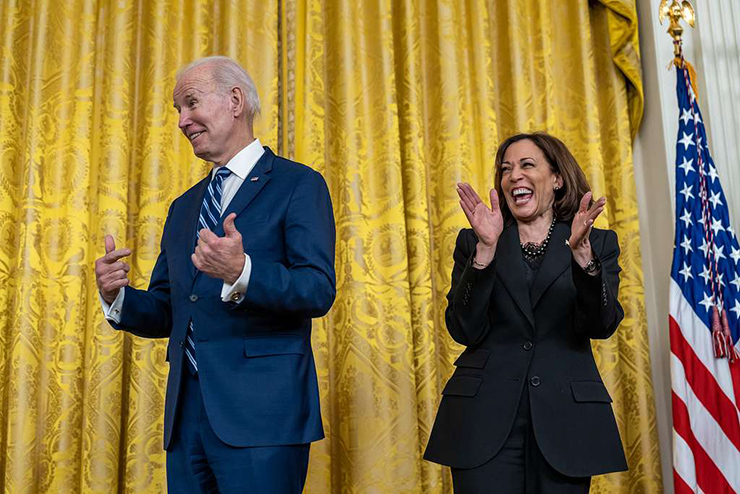During last week’s “fiery” State of the Union speech, a campaign speech that quite clearly targeted the president’s “predecessor,” Joe Biden barked “History is watching!” The use of this platitude, reminiscent of the repeated theme of Dr. T.J. Eckleburg’s eyeball adorned billboard in The Great Gatsby, has the value of being partly right. Someone is watching, and what He sees isn’t good. Americans have lost their way, confusing ordinary periodic electoral politics with the regime itself. Americans need to return to the more fundamental acts of consent that inform our Constitution. For consent, if lost, undermines that constitution’s legitimacy.
Kamala Harris, our next president, is accustomed to repeating supposed profundities, which she does in a way that is not a clear winner over repeating banalities. One of these is “what can be unburdened by what has been.” An internet search suggests this wording is original to Kamala.
The statement “what can be unburdened by what has been” is obviously a rendition of a Christian theme: forgiveness. Forgiveness is overcoming a past injustice for a better future. Woke America’s understanding of overcoming the original sin of slavery is a thing like that. To forgive is to enter into a new phase of life, without the baggage of past wrongs (although the Woke seem to wish to haul steamer trunks full of baggage into the future).
Kamala’s catch phrase also means to move forward without excessive nostalgia. As such, it is not just a progressive slogan but an anti-conservative notion. Conservatism too often devolves into fantasies about the past—as this piece from Lane Scott at The American Mind illustrates well. If Kamala delivered her aphorism better, a word like “unburdened” would have potential as an effective denigration of the right for the aimlessness of its “fauxstalgia.”
Kamala, however, says this thing in ways that signal she does not care what it means, or maybe that she doesn’t know. She says it so often that it makes her sound vacuous. If she knew what it meant, she would use other expressions to convey the same thought and expand upon it. But she is satisfied to remind us of Obama’s annoying habit of deploying platitudes, like “We are the ones we have been waiting for.”
Most all effective rhetoric in America has Christian foundations, however, and this is no exception. The “unburdened” mantra is, for Kamala, an appeal to the notion of being born again just as “we are the ones we have been waiting for” is messianic.
With this in mind, let’s return to the president’s, “History is watching. Just like history watched three years ago on Jan. 6.”
While History as a yardstick of morality is a progressive trope rooted in modern philosophy, it is also an understudy for God, presented in a way that gives breathing space to those Protestants for whom even the very modest doctrinal demands of Congregationalism and Unitarian Universalism are too much and who like to call themselves “nones” in religious surveys. History in this sense is much like Dr. Eckleburg’s watchful eye, a device for the people who would prefer not to mention Him.
The watching Biden warns of evokes a Protestant-Calvinist ideal which springs from the notion of presbyterii fidelium.
With this direct link to God through the notion of a priesthood of all believers, “who’s watching” shifts from the monarchical Church structure—which, in fact, “watches” you through its intermediary powers—to something wholly abstract. Who will supervise the many priests? An abstract watcher. Dr. Eckleburg and History are just ways of talking about the Watcher without forming the word God. It reminds one of a Hebraism, the ineffability of the name of God, which is the origin of the tetragrammaton, YHWH, uttered with the furnishing of the vowels of adonai as Yahweh or Jehovah. Will the real chosen people please stand up?
In New England where these beliefs live vibrantly, the idea of a picture window may have more to do with allowing people to look in than it does with encouraging those within to look out. This is also an expression of presbyterii fidelium. Someone, or everyone, is watching can become a stand-in for divine judgment. It must be that way; the Pope in Rome is not allowed to watch.
Whoever is watching and through whatever medium, one thing He sees is that we Americans have lost the ability to elect, to choose, our form of government. And we are on our way to Hell for that.
What I mean is, we have pitched battles about who fills the offices—and fears that the office must not be filled by him, her, or the other—but we no longer seem to elect or consent to the actual form of our government.
The way we ought to consent to our regime, is to change the Constitution through the amendment process or a convention of states.
There are currently 27 amendments to the Constitution. The last one was finally ratified in 1991, a full generation ago. But it really does not count as an exercise of the privilege of consent because it was ratified after lying fallow for 200 years. It was not even original to anyone living then.
The last soup-to-nuts amendment was the 26th Amendment, ratified in 1971, two generations ago. It stands as the last real act of consent by the general political body of the United States. We have wandered a desert for more than 50 years and there is no living person with a real connection to electing our form of regime.
Thus, as we are unburdened by anyone with a living memory of how to consent to our charter, we try to do so by dangerously battling over its offices, and it’s Hell.

Leave a Reply